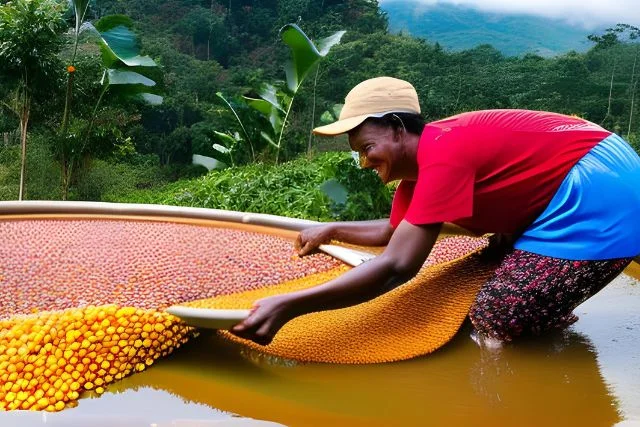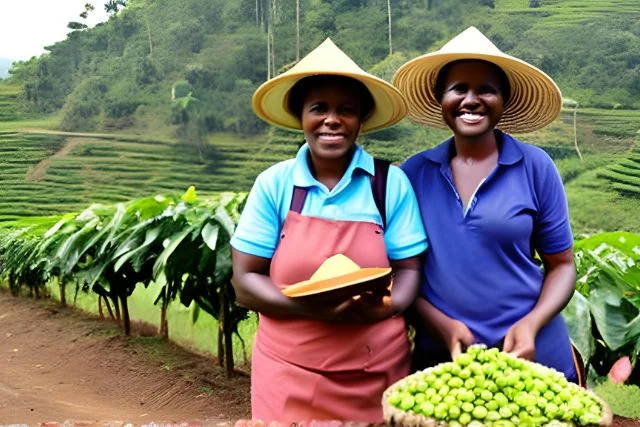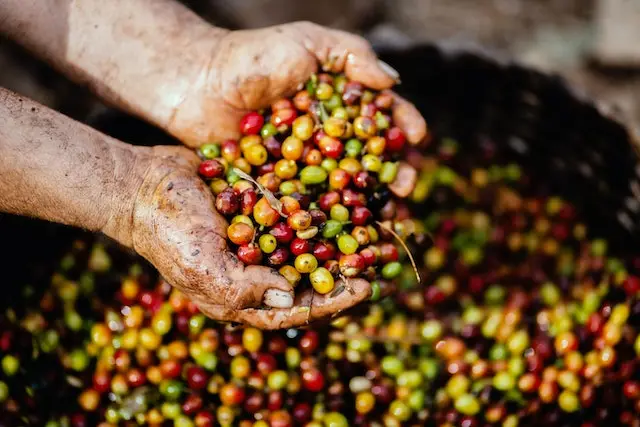Brewing Change: Community-Based Coffee Initiatives
Introduction
Community-based coffee initiatives empower smallholder farmers and promote environmental sustainability in coffee-growing regions around the world. These programs provide economic benefits, encourage responsible farming practices, and help preserve cultural heritage in coffee-producing communities. This blog will examine the roots of coffee cultivation, the rise of community-based initiatives, their multifaceted benefits, challenges to overcome, inspirational success stories, and how you can support these important projects.
What Are Community-Based Coffee Initiatives?
Community-based coffee initiatives support small-scale farmers by helping them grow and process coffee in environmentally friendly and economically sustainable ways. They involve partnerships between coffee suppliers, NGOs, governments, certifying agencies, and most importantly, the coffee farmers themselves. Some key features include:
- Farmer training programs on sustainable practices
- Access to affordable inputs and resources
- Direct trade relationships with fair prices
- Investment in community development projects
- Organic and eco-friendly farming methods
- Crop diversification and food security
- Empowerment of women, youth, and marginalized groups
By participating in community-based initiatives, smallholder farmers gain more control over coffee production and their economic livelihoods. They also help protect local ecosystems and preserve coffee-growing traditions.

The Global Coffee Industry and Communities
Coffee is a massively important global commodity, with nearly 2.25 billion cups consumed worldwide every day. However, the conventional coffee trade has often exploited smallholder farmers. Low and fluctuating prices make it hard for farming families to earn adequate incomes. This has contributed to poverty, food insecurity, and unsustainable practices in coffee-growing regions.
Community-based initiatives aim to transform the model by supporting smallholders, reducing economic pressures, and incentivizing responsible methods. This promotes prosperity in coffee communities while meeting growing consumer demand for ethical and eco-friendly coffee options.
Key Takeaways
- Empowering Farmers: Community-based coffee initiatives empower small-scale farmers by providing training, fair pricing, and eco-friendly practices.
- Positive Community Impact: These initiatives alleviate poverty, enhance food security, and strengthen cultural bonds in coffee-growing communities.
- Challenges and Support: Challenges like climate change and market competition require sustained external support.
- Consumer Impact: Consumers can support these initiatives by choosing ethical coffee brands and raising awareness.

The Roots of Coffee and Community
To understand the significance of community-based coffee initiatives, it helps to look at the deep historical ties between coffee and rural farming communities around the world.
A Brief History of Coffee Cultivation
The origins of coffee cultivation can be traced back to the 15th century in Yemen and Ethiopia. From there, it spread across the globe as a commercial crop during European colonialism. Coffee farming took hold in tropical regions like Indonesia, Latin America, and Africa where rural communities depended on its earnings.
Over centuries of coffee production, unique grower cultures formed around the crop. But many communities also experienced exploitation from colonial powers and later large coffee corporations. This led to unstable incomes and poverty despite coffee’s massive success.
Social and Economic Importance of Coffee Regions
Today, over 25 million smallholder farmers around the tropical belt grow coffee. For rural villages and towns, coffee sales make up a large portion of household income when harvests are good. The crop provides livelihoods, facilitates trade, and supports local economic development.
Beyond economic impacts, coffee is deeply ingrained into social and cultural fabric. Entire community traditions have formed around coffee cultivation, harvesting, and processing. It’s an important part of identity for many groups.

Challenges Faced by Coffee Communities
Though critical for rural livelihoods, coffee production poses many challenges including:
- Pest diseases like coffee leaf rust that can decimate crops
- Climate change disrupting suitable growing conditions
- Price volatility making incomes unstable and unpredictable
- Lack of agricultural resources like fertilizer, tools, and technical assistance
- Poor infrastructure such as roads to access markets
- Low bargaining power against powerful coffee buyers
These obstacles contribute to chronic poverty cycles that prevent coffee-growing regions from prospering despite booming coffee demand.
The Rise of Community-Based Coffee Initiatives
Seeking to rectify this imbalance, community-based coffee initiatives empower local farmers by providing economic and environmental solutions tailored to their needs.
What Are Community-Based Coffee Initiatives?
As mentioned earlier, community-based coffee initiatives involve collaborative programs that:
- Offer training and resources to grow coffee sustainably
- Help farmers organize into associations, cooperatives, or companies
- Facilitate direct trade relationships with fair pricing
- Invest in infrastructure, agricultural development, education, healthcare, and other needs identified by the community
- Implement organic and eco-friendly farming techniques
- Provide access to credit and savings programs
By participating, coffee farmers gain more control over cultivation, processing, and sales of their crop. They also reap more of the economic benefits.

Examples of Successful Community-Based Initiatives
Many excellent models exist around the major coffee-growing regions:
- Latin America: Cooperatives in Nicaragua, farmer associations in Colombia
- Africa: Coffee farmer cooperatives in Rwanda and Ethiopia
- Indonesia: Bukirasih cooperative for smallholders in Sumatra
- Mexico: Zapatista coffee cooperatives in Chiapas
These projects invest in the overall well-being of coffee communities beyond just farming. Many provide healthcare, education, women’s empowerment, microfinance, and more based on local priorities.
How These Initiatives Differ from Traditional Coffee Production
In contrast to exploitative conventional trade, community-based models involve:
- Democratically-run cooperatives and associations giving farmers control
- Direct trade relationships instead of volatile commodities markets
- Higher incomes retained in the community rather than multinational corporations
- Crop diversification for long-term sustainability vs mono-crop coffee dependence
- Investment in food security, health, education, and infrastructure
- Focus on holistic community development beyond just growing coffee
This grassroots approach aims to rectify the power imbalance smallholders typically face in the global coffee industry.

The Benefits of Community-Based Coffee Initiatives
The multifaceted benefits of community-based coffee initiatives promote positive change in coffee-growing regions.
Economic Empowerment and Poverty Alleviation
By participating in community-based models, coffee farmers earn substantially higher incomes. With a greater share of earnings staying within their communities, this helps alleviate poverty. It also empowers farmers with more control over coffee sales and decisions over community development.
With poverty reduction, families can better afford necessities like nutritious food, clean water, healthcare, and education. They’re also able to invest in improving coffee yields and quality through sustainable farming methods.
Environmental Sustainability and Responsible Farming
Many community-based coffee initiatives provide training and resources for organic farming techniques that protect local ecosystems. This includes:
- Natural pest management and fertilization without chemical inputs
- Soil conservation strategies such as cover crops and terracing
- Agroforestry systems that integrate shade trees into coffee fields
- Biodiversity protection like bird and insect habitats
- Watershed management and water treatment
- Waste minimization and recycling
By using responsible farming methods, smallholders can maintain healthy soil, conserve water sources, sequester carbon, preserve forests, and protect wildlife populations surrounding coffee fields.
Social Cohesion and Cultural Preservation
Beyond economic and environmental aspects, community-based initiatives strengthen social bonds and cultural heritage. Shared infrastructure, resources, and community groups reinforce connections between rural neighbors. Participatory models also preserve longstanding coffee cultivation traditions and indigenous knowledge. Strengthening cultural identity and social cohesion fosters community resilience.

The Role of Fair Trade and Ethical Sourcing
Many community-based coffee projects are supported by fair trade and ethical sourcing programs. These ensure higher prices for smallholder crops and closer relationships between coffee drinkers and growers. As consumer demand rises for sustainably sourced coffee, community-based initiatives will continue gaining support.
Challenges and Obstacles
Despite positive impacts, community-based coffee initiatives face uphill challenges ranging from market forces to climate disruptions. Overcoming these barriers is key to creating lasting change.
Market Competition and Pricing Pressures
Small-scale community coffee producers struggle to compete in global commodity markets flooded with low-quality, unsustainably grown coffee driving down prices. Without market protections, community-based initiatives risk being undercut or coopted by large corporations.
Climate Change Disrupting Coffee Production
Rising temperatures, changing rainfall patterns, and weather extremes linked to climate change make coffee farming less predictable. Pests and crop diseases also thrive in warming conditions. This disrupts production and jeopardizes community livelihoods. Climate adaptation is crucial.
Access to Resources and Infrastructure
Many coffee-growing communities lack basic agricultural resources, infrastructure, and social services. Rural poverty traps persist without access to tools, fertilizers, crop finance, transportation, clean water, healthcare, and schools. Community-based initiatives require sustained external support and investment to develop these assets locally.

Maintaining Community Participation
Keeping members actively engaged in democratic community programs takes constant work. Without inclusive governance, shared benefits, and sustained motivation, farmer participation can decline. Community groups must be empowered to make decisions and drive initiatives.
Success Stories
Despite challenges, many coffee communities have prospered thanks to effective community-based initiatives centering on farmers’ needs. These inspiring examples demonstrate real change is possible.
Kayonza Growers Cooperative, Rwanda
In Rwanda, the Kayonza Growers Cooperative provides 4,500 smallholder farmers with resources to improve coffee quality and productivity while investing in local schools, health centers, and clean water projects. Women also hold leadership roles in the co-op.
UCIRI Cooperative, Mexico
Founded in 1983 in Oaxaca, UCIRI was the first fair trade organic coffee cooperative in Mexico. It now includes more than 2,700 indigenous farmers. Beyond higher prices, UCIRI has funded healthcare, education, and sustainable farming resources. Coffee revenues have decreased poverty and out-migration.
Gayo Organic Coffee Farmers Association (Aeki), Indonesia
In Indonesia’s Aceh region, Aeki supports 3,000 coffee smallholders transitioning to organic methods. They reduced chemical input costs while investing in food security crops and reforestation.

Measuring Community Impacts
Tracking data helps quantify the holistic benefits of participatory coffee initiatives:
- Income, poverty, food security metrics
- Rates of child health, maternal health, and education
- Deforestation rates, biodiversity, soil quality
- Participation levels and governance indicators
- Producer prices compared to commodity prices
Sustained positive outcomes across multiple dimensions demonstrate systemic change in coffee-growing communities.
Lessons Learned
These cases offer models and best practices for community-based coffee initiatives:
- Farmer-led democratic structures give participants ownership
- Agricultural training and resources increase sustainability
- Direct trade relationships provide fair stable pricing
- Community-driven development plans address local priorities
- Participation of women, youth, and marginalized groups spreads benefits equitably
- Ongoing data guides continual improvement
When tailored to local contexts with long-term support, community-based approaches can transform coffee economies.
Getting Involved
As consumers, we can directly support community-based coffee initiatives through our purchases, advocacy, and donations.

Choosing Sustainable Coffee Brands
Look for coffee labels and brands that explicitly work with smallholder cooperatives and associations. Fair trade, organic, and direct trade coffees sold by ethical companies fund community-based initiatives.
Coffee Brands Supporting Community-Based Initiatives
| Brand | Location | Community Initiative |
| Equal Exchange | USA | Works with 46 farmer co-ops in Latin America, Africa and Asia |
| Dean’s Beans | USA | Direct trade with cooperatives in Central and South America |
| Camino | Canada | Partners with co-ops in Honduras, Peru, and Congo |
| Café Direct | UK | Works with over 40 grower groups globally |
| Toby’s Estate | Australia | Sources coffee from cooperatives in Rwanda and Ethiopia |
Volunteering and Partnerships
Many non-profits partner with coffee communities to provide technical assistance, resources, and advocacy. Volunteering with these organizations contributes real grassroots impact.
Raising Awareness and Advocating
Educating others in your community about issues facing smallholder coffee farmers draws attention to their cause. Lobbying government and corporate decision-makers also applies pressure for change.
The Future of Community-Based Coffee
Despite ongoing challenges, the future looks bright for sustainable community-based coffee production.
Innovations in Sustainable Coffee Farming
Climate-resilient coffee varieties, agroforestry, water conservation, renewable energy, and reduced waste systems can strengthen environmental sustainability. Digital technologies are also improving efficiency, connectivity, and financing.
The Role of Technology and Data
Digital finance tools, farm management apps, and monitoring technologies powered by remote sensing data will help coffee farmers adapt to climate change. Improved data empowers communities to tell their stories and advocate for support.

Building Climate Resilience
As climate disruptions accelerate, community-based initiatives will focus on strengthening coffee farmers’ adaptive capacities through diversified incomes, local food systems, forest and watershed protection, climate-smart infrastructure, and contingency funds.
Conclusion
Community-based approaches transform coffee production into a holistic force for sustainable development in coffee-origin communities. By investing in local ownership, they restore dignity and prosperity to coffee-growing regions after decades of exploitation. With consumer awareness and engagement, community-based coffee initiatives can scale up regenerative models across the global coffee sector. We all have a role to play in brewing positive change through our daily coffee choices.








